NIT Jamshedpur, in collaboration with the Technology Information, Forecasting, and Assessment Council (TIFAC), organised a specialized brainstorming session on its campus aimed at reducing carbon emissions. The session, which focused on decarbonizing hard-to-abate sectors, brought together esteemed individuals from academia and research institutes, with a particular emphasis on the steel and cement industries—the major contributors to greenhouse gas emissions.
The brainstorming session served as a platform for identifying technological needs and potential solutions to enhance India’s impact on climate change. Eminent guests and dignitaries from TIFAC, Tata Steel, JSW, SAIL, start-ups, and other steel industries shared their insights during the event, which revolved around the theme of “Technology Needs Assessment for Decarburizing Hard-to-Abate Sectors.”
The session commenced with Professor Goutam Sutradhar, Director of NIT Jamshedpur, chairing the proceedings. The chief guest, Prof. Pradeep Srivastava, Executive Director of TIFAC, New Delhi, along with senior scientists from TIFAC, also graced the event.
The focus of the session was to underscore the importance of technology in achieving net neutrality by decarbonizing the steel sectors and driving India towards becoming a cleaner nation. The speakers emphasized that technology plays a pivotal role in spearheading decarbonization efforts in these sectors. They shed light on the process of technology needs assessment, which involves evaluating the existing technological landscape, identifying limitations, and devising effective technological solutions to reduce carbon emissions.
The brainstorming session served as a melting pot of ideas and expertise, fostering discussions on various technical aspects related to carbon emission reduction. The participants engaged in an exchange of knowledge and perspectives, aiming to identify innovative and sustainable approaches to address the challenges faced by the steel and cement industries.
Through this collaborative effort between NIT Jamshedpur and TIFAC, the session sought to pave the way for transformative solutions and propel India’s endeavors towards a greener and more sustainable future.




Recent Posts
Hyundai Glovis to Retrofit Seven PCTCs with Avikus AI Navigation System
Super Terminais orders three more Konecranes Gottwald ESP.10 Mobile Harbor cranes
Covestro and HGK Shipping Extend Partnership to 2040 with Focus on Wind-Assisted Vessel Retrofit
Artemis Technologies Successfully Demonstrates 100 Percent Electric Crew Transfer Vessel at Aberdeen Offshore Wind Farm
IACS Council Advances Decarbonisation, Digitalisation and Governance Priorities at C91 Meeting in Beijing
Japan Launches Major R&D Project to Advance Shipbuilding with Alternative Fuels
EU Adopts Emissions Standards for Low Carbon Hydrogen to Bolster Clean Energy Market
Trafigura to Implement ZeroNorth’s AI Platform Across Global Fleet